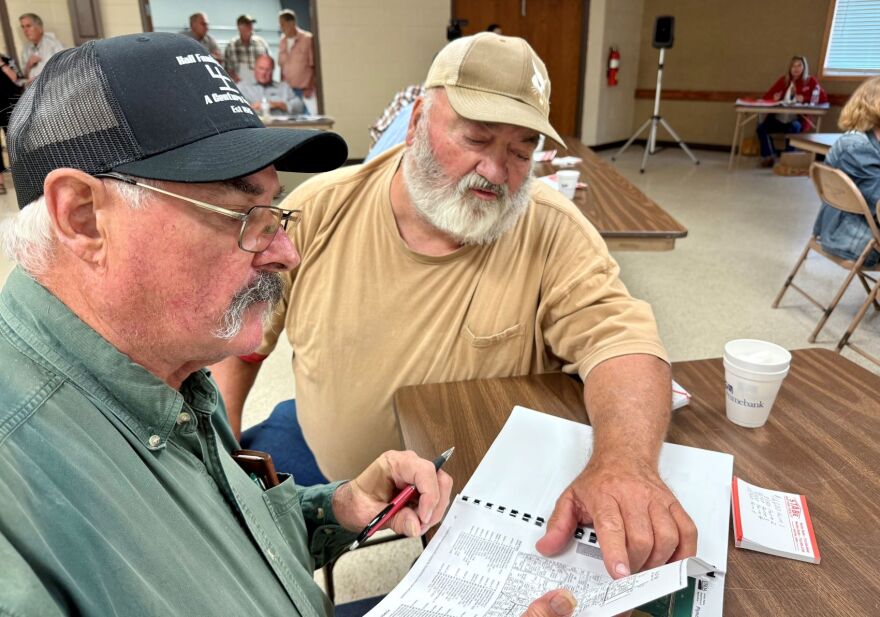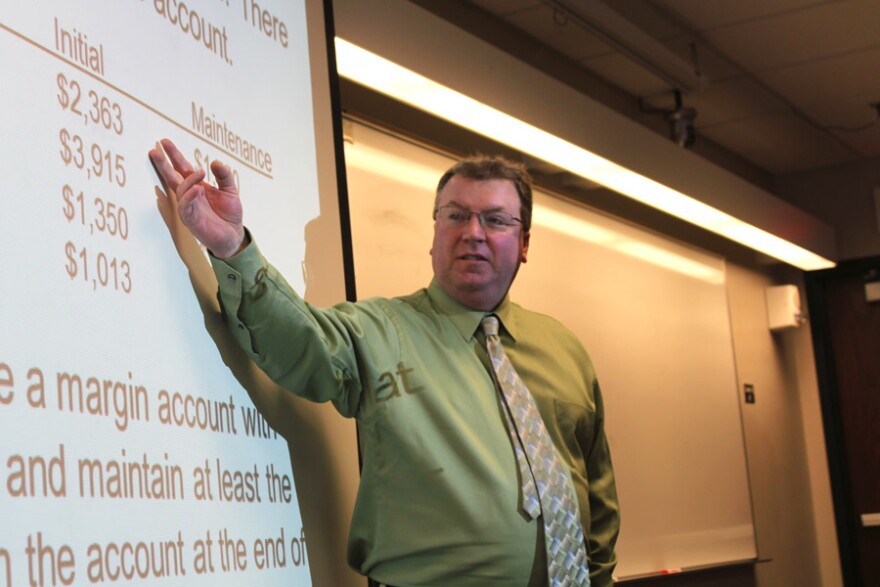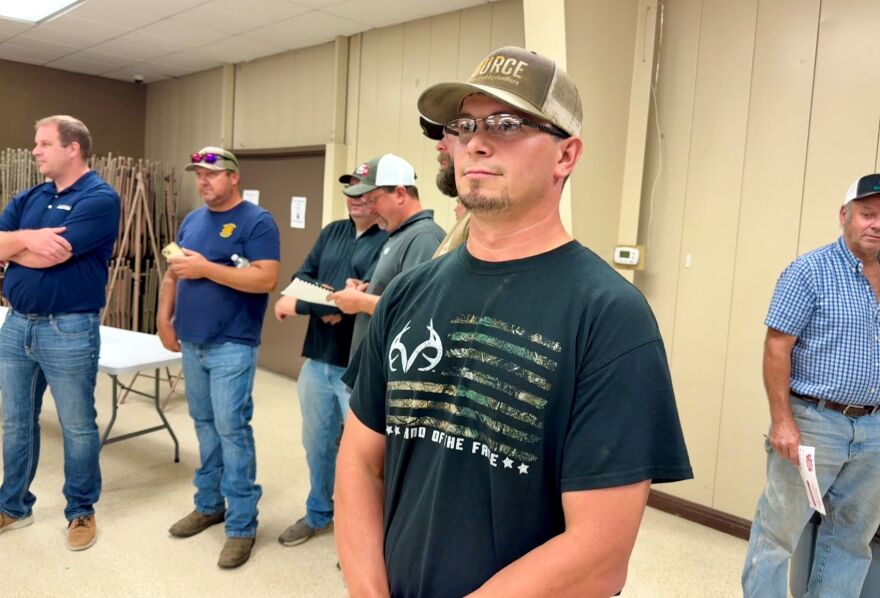Auctioneer Randy Stabe could feel the excitement in the air as he prepared to lead the largest land auction of his career.
“It was a challenge putting it all together, but today's the day, and so I wish all the buyers luck,” Stabe said. “I'm hoping for high prices, and I'm just appreciative of the Eugene Freymann Estate.”
About 100 people filled the Hinton Community Center in northwest Iowa for the auction in September. There was free coffee flowing into Styrofoam cups. Members of some of the area’s most prominent farm families stood in the back. Others sat side by side at tables facing Stabe.
On this day, neighbors tried to outbid neighbors for the land once owned by Freymann, the son of European immigrants. He died five years ago at the age of 90 without any heirs, but with a massive estate.
Peg Vondrak was a friend and neighbor, who first met Freymann 61 years ago.
“He was a very quiet guy who farmed with his brother. They grew up very, very poor and pretty much saved every dollar they had,” Vondrak said. “They just were very frugal, very frugal. The house they grew up in was hardly anything. They didn't buy anything new. The only thing he liked to buy was machinery and land.”

A majority who attended the Freymann auction were men who farm in the area. Many came to try and expand their footprints, and others, like Ron Hall, showed up just to watch.
“I'm just inventorying," Hall said. "Crop prices are down. Enthusiasm isn't probably what it could be."
As the bidding began, Hall predicted two things would drive the sale of about 1,150 acres, broken up into a dozen different parcels.
“The first one is pride of ownership, and the second one is greed,” he said.
Land prices holding steady — for now
Land prices can offer insight into how the farm economy is doing, but the view changes. When times are good, land prices are quick to respond. When times are bad, land is one of the last things to lose value.

Chad Hart, a professor in the department of economics at Iowa State University, said the land auction takes place at a time when the agricultural economy is struggling due to a variety of factors, including lower grain prices and stress from tariffs.
“We're seeing a modest decline on the land value side, even though farm incomes have gone through a much more dramatic drop,” Hart said.
The USDA reported that profits have fallen by about 25% over the past two years. Hart said farm values are off only a few percentage points after soaring to all-time highs in 2023.
"It's the canary in the coal mine when things are getting better, but it's the last thing you want to pay attention to when things are getting worse because it's going to be the last thing to decrease,” Hart said.
Hart believes land holds a special place in agriculture, so farmers will still spend, especially since only a tiny amount of farmland across the state goes up for sale each year.
“We see a lot of folks wanting to maintain an investment in farmland because farmland on its own has offered a pretty good return for the folks that own it,” he said.
New land survey on the way
The Iowa State University Land Value Survey, which comes out in December, will give a current assessment of the condition of land prices.

“If farmland values start going down, that's when we start to worry, and we start to investigate what is going on that's creating a decrease in this asset that we generally like seeing to appreciate,” said Rabail Chandio, assistant professor and extension economist at Iowa State University.
Chandio is the lead researcher for the annual survey, which includes insight from approximately 400 appraisers, brokers, lenders, farm managers and landowners.
“We expect [land prices] to fall a little," she said. "For Iowa, we experienced quite significant highs in the land market during the pandemic, and since our farm incomes are tightening, I would very much like to see that being reflected in a decline in prices for the next two years."
Chandio said Iowa is by no means in a situation where farmers will see crashing land values, as was the case during the farm crisis of the 1980s.
“Right now, we are going through a downturn. After the peak, we are now in the valley of that transition, where prices are stabilizing. They are lower,“ Chandio said. “I like to highlight whenever I'm talking about farm incomes, we are still slightly above or on par with the 20-year average of net farm income.”
How the auction turned out
The Freymann auction revealed people are still willing to pay market value for farmland.
In Plymouth County, the average acre sells for more than $14,000. The highest bid at the auction in September was $18,000 per acre — a majority of the others averaged less.
“Some of it’s surprising, some of it’s not,” said Troy Boetger, who raises corn, soybeans and a few cattle east of Hinton. “Some of the prices are just out of my range and some of those farms are further away from home.”
Boetger said he would love to get his hands on some farmland. Considered a young farmer at the age of 32, he rents and is unsure if he will ever be able to afford to buy, like Eugene Freymann managed to.
In Iowa, two-thirds of all land is owned by those who are 65 and older.
“I’m a third-generation farmer, but these younger generations probably can't do it," Boetger said. “It's not for everybody, that's for sure. It's a lot of times a struggle, but it's a way of life that you know people love to do.”

Also monitoring the action was Josh Kovarna, president of Primebank in nearby Le Mars. His financial institution holds $900 million in farm loans.
“We have seen a little dip, but it’s still very strong,” Kovarna said. “Some people are struggling in the current market with the higher interest rates. You know, interest is doubled in the last four or five years, so that has a big effect on it.”
With the decline in farm income, the percentage of farmers nationwide struggling to repay their loans has increased slightly, but remains low overall. Kovarna said many local farmers still have cash on hand to expand and compete in a changing agricultural landscape.

“We had local farmers bidding. There were no outside investors, which from a farmer's perspective, is always nice to see,” Kovarna said. “I don't feel that the low markets and the high interest rates affected today's auction.”
Ron Hall, who came as a curious onlooker, said farmers know how to stay resilient even through the current ups and downs.

“You know, it's a lifetime endeavor. You know the seeds you plant today, you might not reap until 10 years from now. That's just the way it is,” Hall said. “I think that things ended up at the end of the day today probably as good as they were going to do. There were hills and valleys.”
In the end, Eugene Freymann’s land brought more than $13 million, with proceeds going to his church, Briar Cliff University, Morningside University and St. Jude Children's Research Hospital. A lifelong legacy of land, now in the hands of new owners.
“He was also generous to some of the people who were renting his ground,” Auctioneer Randy Stabe added. “This auction was what he had left, and he accumulated quite a lot of farm ground.”






